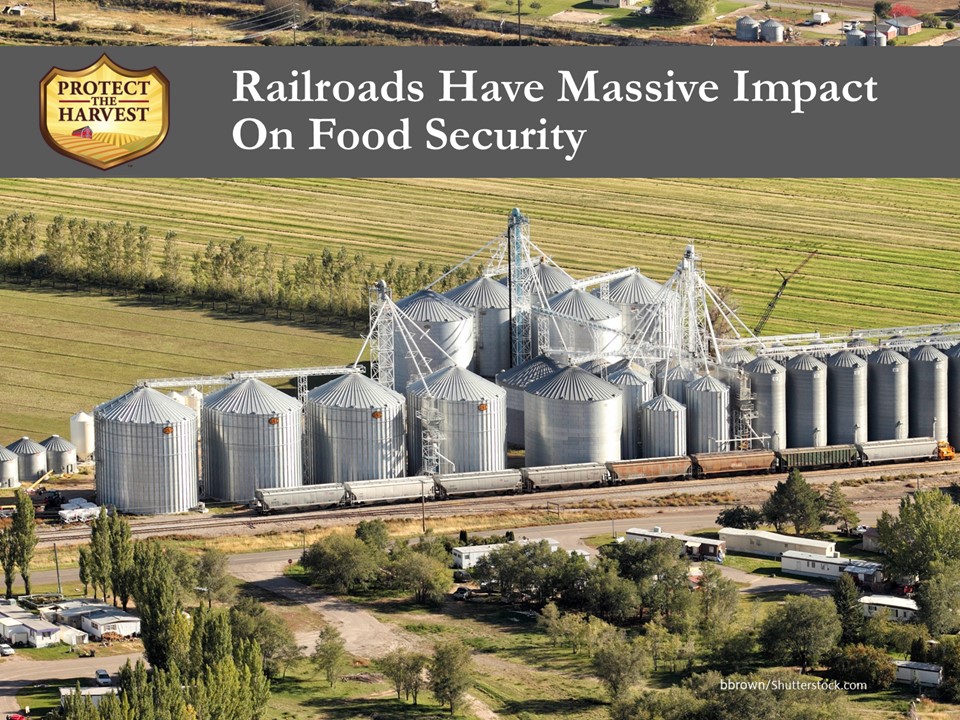
Railroads Have Massive Impact on Food Security and Food Availability
By Jaclyn Krymowski for Protect The Harvest
The role trains and railways play in our economy and food system, food security, and their value in the transport of essential goods are greatly undervalued by the public. Even when the dangers of a union strike make headlines, the threat gets little more than a passing thought. Preserving the integrity of our railways is not a matter of mere convenience. It is essential to the function of agriculture, food, and many interconnected industries.
Railroads and Dominos
Many of our country’s raw materials and commodities rely heavily on the railroad for transportation. The railroad impacts not only domestic consumers but also the export supply chain.
A widespread rail strike would ripple across our economy and infrastructure in a domino-like effect. Almost immediately, consumers and producers would feel a huge impact. Consumers would feel the emptiness of grocery store shelves and further strain would be placed on already inflated prices for domestic raw goods and packaged products. Of all consumer-ready packaged food products, about 30% are moved by railway. Likewise, processors for many packaged products, such as cereal, cooking oils, and bread, rely very heavily on rail deliveries of raw ingredients.
According to Tom Madrecki, Vice President of Supply Chain for the Consumer Brands Association, without railroads, it would take only about a week for everyday retail customers to notice a shortage of consumables at the grocery store.
Most businesses only stock a limited number of supplies at any given time. This is especially true for food processors that deal with both commodities and fresh, perishable staples. Madrecki noted that many processors only keep about 2-4 days’ worth of raw ingredients at any given time due to the cost and complexity of long-term storage.
Farmers and grain elevators on the shipping end would become backlogged. Livestock would go without sufficient feedstuffs for production, resulting in packing delays and health issues. The issues even extend beyond our borders as commodity exports will not reach ports.
History Shines Light on Looming Threat
The American Farm Bureau Federation, one of the foremost voices for domestic farmers, has stepped forward to work with Congress and railroad unions to meet concerns to prevent a strike, citing the devastation it would pose for farmers and consumers.
In 1992, when the U.S. last saw railroad strikes, it took two full days for Congress to intervene. Today, both Congress and the office of the President are working to meet the demands of the union’s contract terms to avert a strike. A strike would not only keep products from reaching their final destination but would also cause other problems on the supply end by creating backups that facilities are not equipped to handle.
In 2022, if a major railroad strike were to happen, from a strictly economic standpoint it would cost the U.S. as much as $2 billion per day. When it comes to the production of food products and other goods, it is much more difficult to quantify opportunity costs and loss of food affordability and security.
Given the efficiency and scale of agricultural commodities, constant movement is essential for keeping fresh produce and processed foods in front of consumers at all times. If gone unresolved for too long, shortages could limit resources for planting and harvesting in the next year.
Panic Purchasing
Madrecki also pointed out that major food suppliers tend to keep quiet about the very real dangers of a strike so they do not incite panic buying. Panic buying can quickly exacerbate already strained supplies. Just look at what happened during COVID, where consumer panic led to shortages of staples such as toilet paper, milk, and eggs. This type of consumer behavior is especially impactful on families who reside in food deserts (often rural or inner-city environments) and face food insecurity.
Clean Drinking Water and Railways
Most people are unaware that the railway system even impacts access to clean drinking water, particularly those who rely on publicly owned sources. This is because treatment plants count on trains to keep them stocked with chlorine and other treatment products.
Significance to Exports
According to the National Grain and Feed Association, 1.2 billion carloads are shipped by producers and about 25% of the grain in the U.S. is transported by train. Not being able to move this important product, especially for export, would greatly decrease its availability.
The gravity of railroad reliance has been echoed across agriculture organizations and associations. An article from the Epoch Times noted that:
“The Agricultural Retailers Association and nearly 70 other agriculture associations sent a letter to Congress asking for intervention and describing the role of the U.S. rail network that moves agricultural inputs and large quantities of agricultural products to domestic facilities and ports for export abroad. Some of the signers include the National Corn Growers Association, National Cotton Ginners Association, Beer Institute, Leather and Hide Council of America, and The Fertilizer Institute.”
It should also be noted that international dependency on our exports has recently increased due to the conflict in Ukraine.
Food Insecure Families Would Suffer
With more Americans struggling to afford food in recent months due to inflation, fewer options at the grocery store and even higher prices due to a railroad strike would exacerbate community issues. Food banks across the country are already overburdened and struggling to keep supplies and donations strong enough to meet demand.
A true food shortage or even delayed movement of both raw commodities and packaged food products could further constrain or totally halt their services.
Long-term Ramifications of a Strike
Since food is consumable and perishable, a significant disruption by a railroad strike could cause commodities to be stored improperly or delay harvests, causing mass spoilage. Not only would a strike impact the availability of materials, but job numbers as well. If there was a deep enough supply shortage, jobs could be cut or eliminated, increasing the potential for families to scramble to find adequate and affordable food sources.
If the transportation by rail stops for crops, there is no protocol or a backup plan in place. It is a double whammy too as the trucking industry is struggling. This is the same struggle faced by industries that supply coal, crude oil, steel, lumber, car parts, and other items frequently loaded onto freight trains.
The railroad sector is an integral part of our food security. The logistics provided by our railroad system impact the food supply chain and the ready access and availability we experience today from raw commodities to packaged consumer-ready products. Even a temporary pause in only a fraction of the system would have ramifications that could last months, if not years.
Food Security
We want to see a free and fed America now and in the future. Food security is the cornerstone of this goal. At Protect The Harvest we will continue to provide information that impacts our ability to feed our families. We encourage sharing our information so that others are aware of the risks we face today in America. That way they can make choices that will help to secure food security for today and in the future.
Links
Article in The Hill HERE
NBC News HERE
Article in Food Dive HERE
PBS Newshour article HERE
wwnytv.com article HERE
Article in Spectrum News HERE
Epoch Times article HERE



